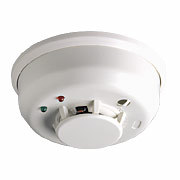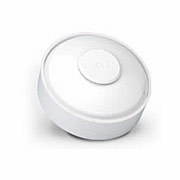Honeywell 5806W3 vs Honeywell 5809
The Honeywell 5806W3 and the Honeywell 5809 are both life-safety sensors. They are both used to alert building occupants to the presence of a fire, and they will both interface with the same security systems. However, the 5806W3 is a smoke detector, while the 5809 is a heat sensor.


The 5806W3 and the 5809 are both part of the Honeywell 5800 Series of sensors, and they both communicate at a wireless frequency of 345 MHz. This makes them both compatible with the same alarm systems. These devices will function with any Honeywell Lyric Controller, Honeywell LYNX Touch and Honeywell VISTA System with an added wireless receiver. They can also both interface with the GC3 and GC2 Systems from 2GIG.
However, the two devices function in very different manners. While both devices will alert building occupants to the presence of a fire, how they detect the fire is very different. The 5806W3 is a smoke detector, meaning that it responds to the presence of smoke. But the 5809 is a heat sensor, meaning that it responds to high temperatures. The 5809 will activate upon either detecting a temperature above 135°F or after sensing a temperature increase of 15°F in a single minute.
Once the device activates, it will send a signal to the alarm system to perform the programmed Response Type. This typically involves sending an alert to the user and/or a central monitoring station, informing the recipient of the fire. But one big difference is that the 5809 can only respond to an actual fire once. After its heat sensor has been activated, the device will need to be replaced entirely. But the 5806W3 can potentially be reused, even after responding to a fire. Finally, as wireless devices, both the 5806W3 and the 5809 will require battery replacements about every three to five years.
Did you find this answer useful?
We offer alarm monitoring as low as $10 / month
Click Here to Learn MoreRelated Products

Related Categories
- Answered
